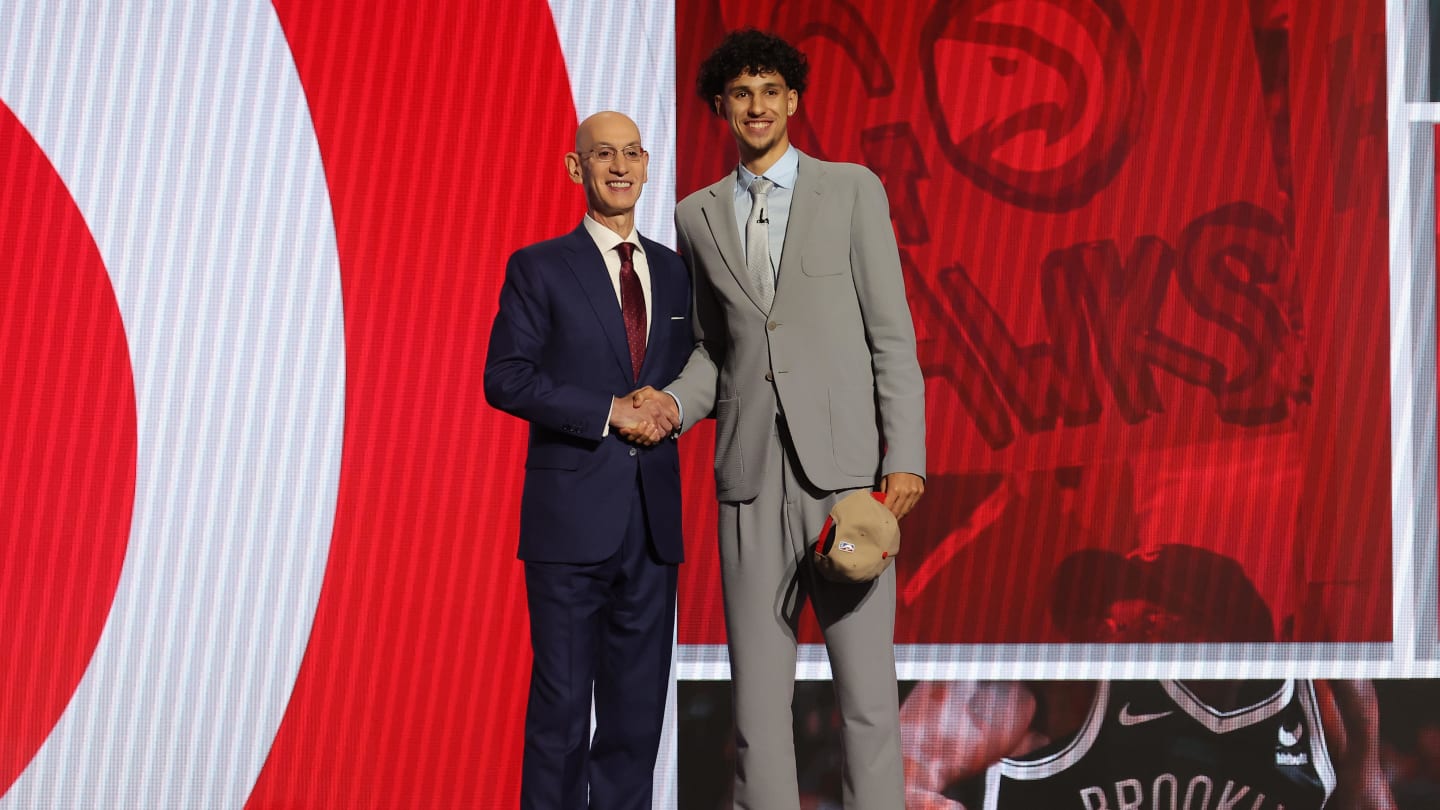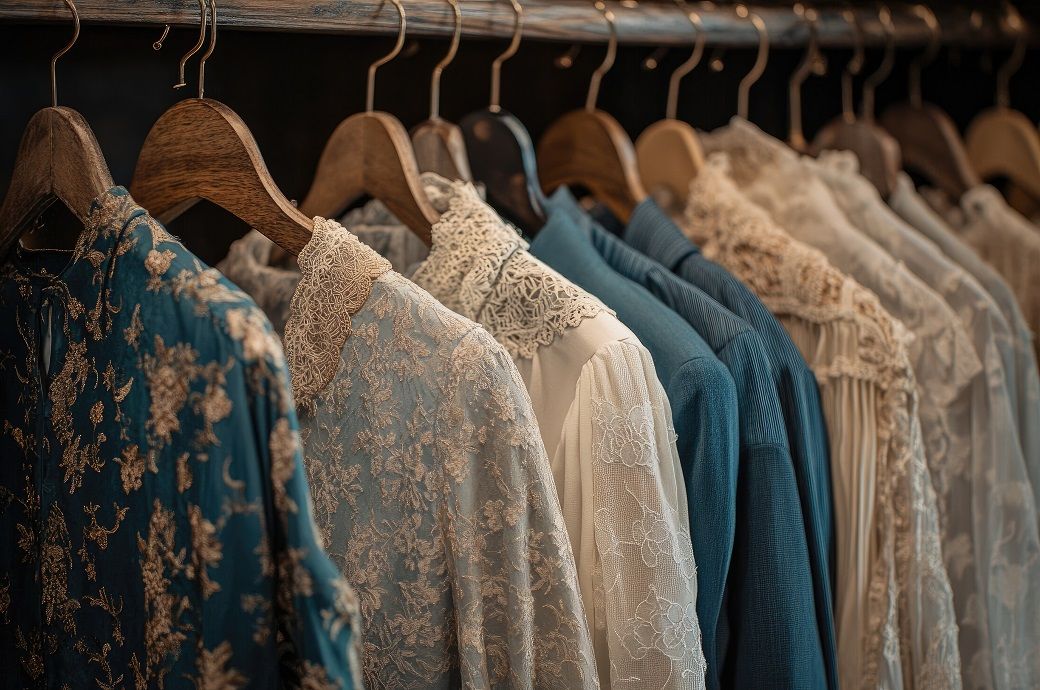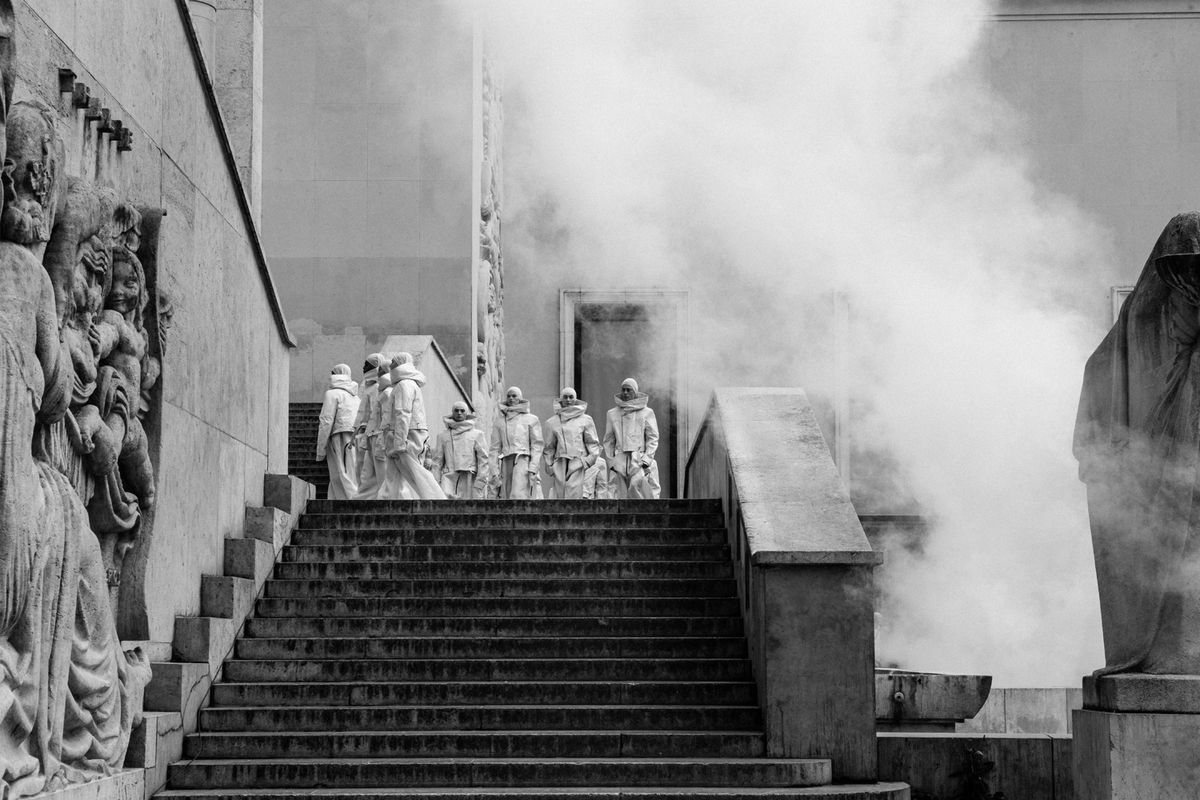Sports
NBA Draft Grades: Zaccharie Risacher, Alex Sarr Earn High Marks as Frenchmen Go 1-2

Welcome to the 2024 NBA draft! This draft class has been defined by its lack of star power at the top, but Wednesday’s first round is still expected to be a defining moment for a number of franchises drafting near the top.
Sports Illustrated graded every move of the first round, going pick-by-pick to break down the biggest winners and losers of night one of the draft. Which teams should be happiest with how their boards shook out and which fan bases should be shaking their heads in frustration? Here’s a look at how everything played out.
Risacher was long believed to have the inside track to the top spot, and any draft day drama was avoided when the Hawks made him the first pick. Is he likely to be a perennial All-Star? Perhaps not. But Risacher’s combination of size, feel and shooting ability give him a high enough floor and ceiling to justify this pick for an Atlanta organization that’s very much in limbo. In an ideal world, perhaps he turns into a complementary star like Khris Middleton in Milwaukee, but if nothing else, he should be a positive contributor for the Hawks for years to come.
Grade: B
In the eyes of many evaluators, Sarr is the most naturally gifted player in this class. The 7-footer is remarkably mobile for his size, giving him the ability to switch and protect the rim defensively. On the other end, his ability to stretch the floor gives him “unicorn” upside if he can continue to improve in dealing with physicality. For a Washington organization in full rebuilding mode, landing arguably the highest-ceiling player in this draft is a big win, and for Sarr, entering an organization that will be patient with his development is a good fit.
Grade: A
The odds Sheppard would be the first college player off the board at this time last year would have been unthinkably long, but his special freshman season at Kentucky won over NBA executives in a hurry. Houston seems intent on pushing to compete sooner rather than later, and adding the best shooter in the draft in Sheppard fits that timeline well. Sheppard’s competitiveness and team-first play style fits well into the young Houston backcourt that also features Amen Thompson, Jalen Green and Cam Whitmore as well as veteran Fred VanVleet.
Grade: B+
There’s a high sense of urgency in San Antonio to surround Victor Wembanyama with pieces to help contend in the Western Conference. Drafting Castle makes a world of sense with that timeline as a versatile two-way wing with significant playmaking upside. He was outstanding during UConn’s national title run, especially on the defensive end, where he’ll make an impact right away. The swing skill is his three-point shot: If it becomes consistent, there’s a real chance Castle ends up being the best player in this draft class.
Grade: A
The first big surprise of draft night was the Pistons selecting Holland, who many pegged to be a draft day faller potentially into the late teens. From a talent standpoint, there’s some logic here for Detroit: Holland averaged nearly 20 points per game playing with G League Ignite this season and was thought of as arguably the top prospect in the country heading into the season before the Ignite setting exposed some of the flaws in his game. But the fit in Detroit is shaky given the Pistons are already heavily invested in another non-shooting wing in Ausar Thompson. Holland’s explosiveness in transition raises his floor, but this feels like a boom-or-bust selection by Detroit and one that could have potentially been made after trading back a few slots.
Grade: C
The draft’s French influence continues, with a third France native off the board in the first six picks. Salaun’s an impressive athlete who has shown signs of shooting promise, though he did shoot just 31.6% from three this season for Cholet in France. His fairly mechanical game creates some questions about scoring potential, but landing a big wing shooting prospect with size and explosiveness to play multiple positions is a solid outcome for Charlotte.
Grade: B
Clingan slid down the board slightly after many believed he could hear his name called in the first three picks, but his floor on draft night was always likely Portland at No. 7. It’s a major coup for Portland, picking up an elite rim protector prospect with Rudy Gobert–like upside without having to move up the board at the expense of future draft capital. Having dynamic young guards like Scoot Henderson, Shaedon Sharpe and Anfernee Simons setting Clingan up seems like an ideal way to maximize his offensive skill set as well.
Grade: A
Our first draft night trade! The Timberwolves moving up the board for Dillingham certainly classifies as a surprise. Fresh off a trip to the Western Conference finals, Minnesota adds the most electric scorer in this draft class. Dillingham’s slight frame has created concerns about how he’ll finish at the rim and defend at the next level, but you can’t deny his shot-making instincts. Plus, Minnesota seems like the ideal situation to insulate his weaknesses with rim protection from Gobert and Karl-Anthony Towns and another scoring star in Anthony Edwards in the backcourt. This is a bit higher than I’d have expected to hear Dillingham’s name called, but the fit makes lots of sense.
Grade: B+
The two-time college National Player of the Year lands in the top 10 of the draft, with Memphis taking him at No. 9 after reportedly exploring trades to land Clingan. Edey going top 10 will certainly be polarizing, but his film from his senior year makes a strong case he’ll carve out a useful role in the NBA. His mobility remains a question, but Edey’s ability to punish smaller defenders, dominate the glass and protect the rim in drop coverage gives him a path to useful rotation minutes early for a Grizzlies team that needed size and is hoping to get back in the postseason picture.
Grade: B
A bet on Williams is a bet on bloodlines, with his brother Jalen’s rapid ascent into a star for the Oklahoma City Thunder only adding to the intrigue in the smooth wing out of Colorado. Williams had an up-and-down season in Boulder, fighting off multiple injuries as he tried to carve out a role on a veteran Buffaloes squad. Williams’s length and finishing ability are impressive, and the upside if he puts it together is immense. This is a big swing for Danny Ainge and the Jazz brass, but one that could pay off if Utah can afford to be patient.
Grade: B-
Buzelis was believed to be heavily in play with Detroit at No. 5, but after the Pistons selected Holland, Buzelis slides all the way to his hometown Bulls at No. 11. There’s plenty of logic to this choice for Chicago, adding a big wing with high-level feel and explosive leaping ability. He shows flashes of blossoming into an impact NBA scorer, and if nothing else, he should be a connector offensively who is more than capable of holding his own on defense.
Grade: A-
If any team could afford to “redshirt” a talent like Topic, it’s Oklahoma City, given the war chest of future draft capital the Thunder have amassed. Topic, who tore his ACL earlier this year and may not be ready to play until the 2025–26 season, was believed by many to be a top-five talent in this draft class prior to the injury. There are some similarities here stylistically to Josh Giddey, once believed to be a key part of Oklahoma City’s future before struggles this season led to him being traded to Chicago. This won’t address the Thunder’s immediate needs as they push toward championship contention, but it’s yet another talented piece to add to the loaded young core in Oklahoma City.
Grade: A-
After reportedly exploring trade options, the Kings stay at No. 13 to take Carter, a plug-and-play backcourt piece fresh off winning Big East Player of the Year at Providence. Known as one of the most ferocious defenders in the class, Carter can team up with Keon Ellis and Davion Mitchell in Sacramento to form perhaps the best perimeter defense bench unit in the NBA. If he maintains the growth in his three-point numbers from his final season at Providence, he’s worth betting on as a guy who’ll outperform his draft stock.
Grade: A
Washington added this pick as part of the reported Deni Avdija trade and landed on Carrington, the DMV native who had an explosive first year at Pittsburgh. There are some valid concerns about his lack of physicality and ability to get to the rim, but Carrington’s shot creation ability off the bounce is as good as anyone’s in this class. Still just 18 years old, this is another developmental project for Washington, but one that fits its rebuilding timeline.
Grade: B
What’s most fascinating about this pick is that the primary knock on Ware as a prospect has been his inconsistent motor. For an organization that prides itself on competitiveness and work ethic, a marriage with Ware seems off-brand on paper. That said, maybe it’s exactly what the Indiana product needed to unlock his full potential. Tools-wise, you won’t find many college bigs more talented than him. This will be a very interesting one to track long term.
Grade: B-
McCain’s a ready-made role player with his elite three-point stroke and high-level competitiveness. Duke coach Jon Scheyer raves about how McCain boosted the Blue Devils’ locker room a year ago, and adding him to a Philadelphia team that keeps taking cracks at the top contenders in the East makes plenty of sense. His physical limitations may cap McCain’s ceiling, but he’s a safe bet to boost an NBA rotation from Day 1.
Grade: A-
I had a top-10 grade on Knecht, and his draft night range was expected to be in the Nos. 5–9 range before slipping Wednesday night. Defensive woes aside, Knecht is fresh off a remarkable season at Tennessee where he proved himself to be one of the most polished scorers in the draft class. He’s an elite shooter with real on-ball juice, and should be good enough to provide an immediate spark to the aging Lakers core.
Grade: A
The Magic have their nucleus in place and are now on the hunt for controllable role players around them. That makes the da Silva fit a logical one. He’s a versatile wing player who can space the floor and is one of the most cerebral cutters available. He’s not a star, but the floor is high after a highly productive career at Colorado.
Grade: B
The Baylor product is the most prototypical three-and-D wing in this draft, flashing impressive length and shot-making ability during his lone season at Baylor. Walter struggles to create separation off the bounce and will likely be pigeonholed as a catch-and-shoot guy, but he and Gradey Dick give the Raptors a pair of potential knockdown shooters on the wing long term.
Grade: B-
Tyson exploded during his third college stop at Cal, averaging nearly 20 points, seven rebounds and four assists per game as a junior in 2023–24. He’s a consistent three-point shooter with some on-ball upside, though he’ll find it more difficult creating his own shot against better athletes in the NBA. This is earlier than I might have jumped in on Tyson, but his playmaking ability does raise his upside relative to other wings still on the board.
Grade: C+
The Pelicans had been known to covet Missi, the mobile big from Baylor with immense defensive upside. Missi is one of the few bigs who defends capably both in drop coverage and as a switch man, and Baylor’s staff raves about the growing parts of his game offensively we didn’t see much in games during his lone year in college. With Jonas Valanciunas set to hit free agency, there’s a path to early minutes in New Orleans if Missi develops quickly.
Grade: A-
Perhaps the worst-kept secret in the draft was a draft night promise from Denver to select Holmes at No. 28. It appears the Nuggets were so infatuated with the Dayton product that they chose to move up to ensure they got their man. Holmes has developed into a very gifted offensive player, improving his shooting touch significantly through his three college seasons. He’s a bit of a tweener size-wise and an awkward mover. This feels like a reach, but given Denver’s limited avenues to improve its roster due to its cap situation, if it feels this strongly about Holmes, it makes sense to go up to get him.
Grade: C
Johnson showed some flashes of upside during combine week in Chicago, but it’s fairly unprecedented for a player as unproductive as Johnson was in Australia last season to end up as a first-rounder. This feels like a piece Milwaukee will stash in the G League to develop for now. He’s not a reliable shooter yet and he struggles to gain separation off the bounce.
Grade: D
Washington continues its theme of young upside swings, this time drafting a long shooting wing in George out of Miami. Critics will point to George’s lack of rim pressure as a significant ceiling limiter, but the flashes as a shooter are real and George’s frame is very impressive.
Grade: B
Many expected the Knicks to use their first-round picks to address their frontcourt or add a rotation-ready piece, but instead New York landed 18-year-old Dadiet, another three-and-D wing from France. Dadiet seems like a long-term project given how much the Knicks have invested in their wing group in recent days with the reported acquisition of Mikal Bridges and re-signing O.G. Anunoby.
Grade: C+
The Thunder moved back into the first round to get Jones, the Weber State product who has drawn comparisons to Josh Hart as a hard-playing connector on the wing. General manager Sam Presti has been known to covet uniquely built prospects who don’t fit traditional roles, and Jones qualifies with his thicker frame and high-level rebounding and passing. This may be a reach, but it’s not hard to see the thinking here.
Grade: B-
Minnesota’s strong day continues with the addition of Shannon, one of the most productive college players in the draft. Long on draft radars, Shannon’s three-point shooting growth this season finally made him a viable first-rounder. Adding a young, controllable wing with elite athleticism who can plug into the Timberwolves’ rotation makes all the sense in the world for Minnesota.
Grade: A
Dunn is an outlier as a prospect, with ridiculous defensive tools paired with being largely a zero on the offensive end. If there was a perfect situation for him to end up in, it’s probably Phoenix, given the Suns will likely ask little to nothing of him offensively while allowing him to cover up mistakes from what was a middling defensive unit a year ago.
Grade: A-
The slide for Collier, who was the highest-rated recruit playing college basketball this season, finally came to an end at No. 29 in Utah. At this point in the draft, this is more than worth the risk. Collier is not without his flaws as a decision-maker and shooter, but his ability to generate paint touches and play in ball screens isn’t matched by many in this draft. For an organization that will struggle to attract star power in free agency, this is well worth the risk, especially this late.
Grade: A
We’ve seen the success Boston has had with shooting specialists, namely Sam Hauser. Enter Scheierman, who made 110 threes last season at Creighton. He starred in the scrimmages at the NBA draft combine in May, showing how his constant movement off the ball, deep range and competitiveness could impact the game at the next level. This is a pick that has the chance to help the defending champs right away.









